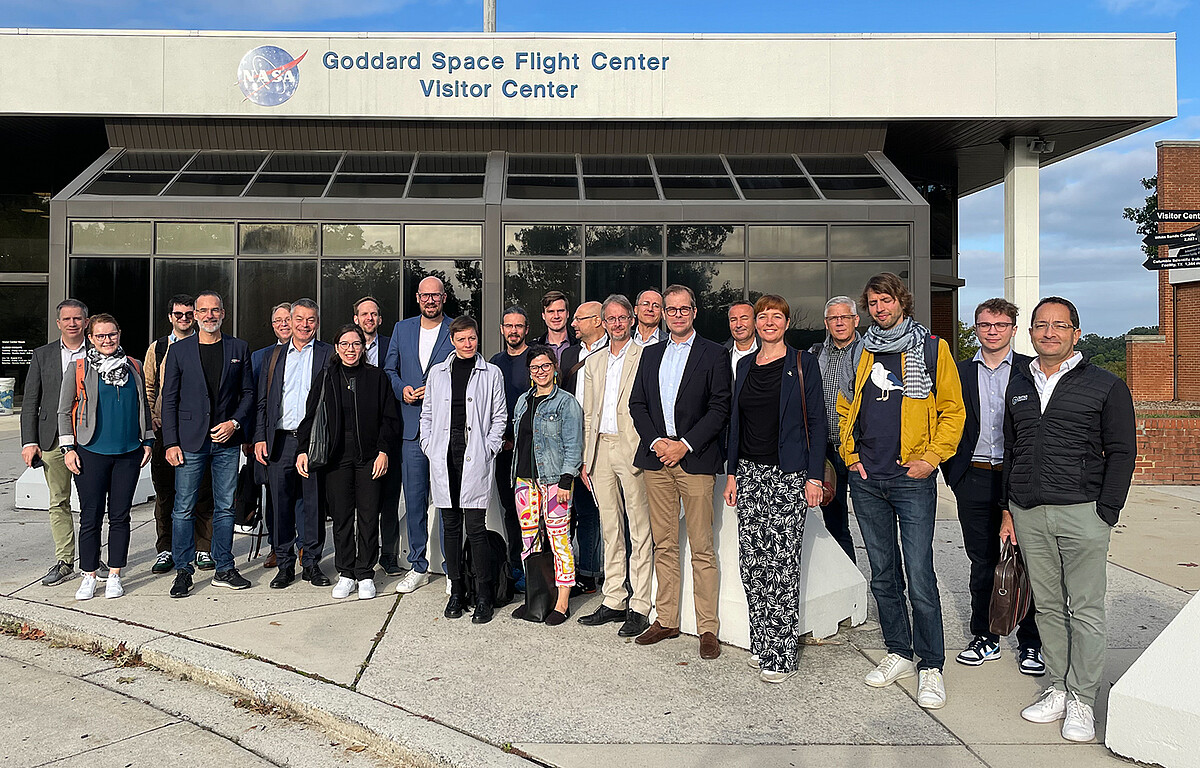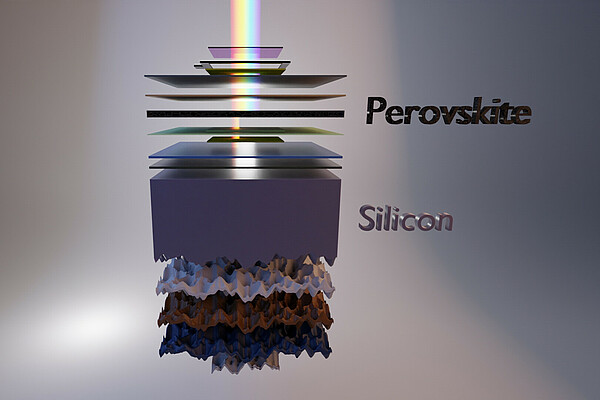Where Small is Big – Berlin Is Strong In Quantum Tech
There’s more than a quantum of technology in the German capital.
A quantum is the smallest amount of energy you can measure. In physics, the smallest particles possible exhibit the strange phenomenon of being both matter and wave simultaneously. Yes, we’re talking about light, which is electromagnetic energy. And this leads us directly to optics and photonics, the branch of technology concerned with the properties and transmission of photons, that is light particles, for example in fiber optics or lasers.
The other area that is all about the movement of tiny amounts of electrical energy is the design and manufacture of microchips and microcircuits. One way to speed them up is to have the electric signal within a microchip move faster, perhaps even as fast as the speed of light. In optoelectronics, for example, light is used to excite the electrons in semiconductors.
So quantum technology (QT) is all about light and really small particles, and the applications have to do with computers, sensor technology, communications, as well as optical technology. Actually, the potential range of applications is huge, from photovoltaic to healthcare, telecommunication to industrial manufacturing, encryption to metrology, that is measurement, and not least, logistics.
Generally speaking, when people refer to quantum tech or quantum electronics, they are currently still talking about scientific research, whereas people involved in photonics are in the engineering or application stage. One of Berlin’s great strengths is the wealth of connections between the many world-class scientific institutions in town and the tech and business sector, creating transfers that ultimately lead to products. Berlin is in the process of positioning itself extremely well in the relatively new field of quantum technologies.
Berlin’s Quantum Initiative
If you’re interested in photonics in Berlin, your first port of call should be Berlin Partner’s cluster management optics and photonics Berlin Brandenburg. A while ago we spoke with cluster manager Gerrit Rössler for an article we called Berlin – City of Light. Since then, Berlin’s quantum ecosystem, that is Berlin's business community, research institutions and universities, have got together to form BERLIN QUANTUM. The state government sees so much potential in this sector that it is providing €25M in funding for four years. Thomas Krause, who heads the department of Energy, Digitalization and Industry in the Senate, said simply, quantum technologies are “the next big thing”.
The funds are to be used to strengthen the already existing expertise as well as to attract talents in the field from all over the world, for example to encourage basic research but also to initiate innovative business ideas. The original concept for this initiative comes from the Berlin University Alliance, an association including the three major Berlin universities and the Charité, with contributions from two Fraunhofer institutions, Heinrich-Hertz-Institute and Fraunhofer FOKUS, all with great expertise in quantum technology. The three universities are:
- The Free University (FU)
- The Technical University (TU)
- The Humboldt University (HU)
Furthemore, the Einstein Foundation as an independent institution promotes science and research in and for Berlin at the highest international level, for instance with their Einstein Research Unit. Professorships in the field of quantum technologies (computing and communication) have already been funded. New professorships are to be created as part of Berlin Quantum.
We asked Prof. Arno Rauschenbeutel, professor at HU Berlin and spokesperson of BERLIN QUANTUM, what makes Berlin such a quantum hotspot.
“Berlin is an internationally renowned hotspot for cutting-edge research in the field of quantum technologies. The location is characterized by a broad spectrum of expertises (quantum communication, sensors, computing and key technologies in photonics, microelectronics and software) represented by excellent scientists in both fundamental and applied research. BERLIN QUANTUM not only promotes QT research, but also drives the technology transfer from the laboratory to real application.”
One of the first things the BERLIN QUANTUM did was send a large official delegation to the Quantum World Congress in Washington D.C.. The trip was a chance to meet with the likes of NASA at the Goddard Space Flight Center, IBM, Boeing, and quantum firms such as IonQ, Q-CTRL (see below), or Infleqtion. Many of the delegates were greeted as friends and business partners by the companies they visited. For instance, Claus Heitman, CEO of Toptica Eagleyard, based in Adlershof Berlin, was delighted to see his company's lasers being used in research labs and in production facilities at IonQ.

Speaking of Adlershof, a new innovation hub and coworking space for quantum technologies was recently unveiled at the Berlin Adlershof Innovation and startup center: the Leap. It provides workspace and event space, in short a hub for exchange, networking and collaboration between actors from science, business and the startup scene addressing the potentials and challenges of quantum technologies. There is even free space for new startups who want to take a look at Berlin's quantum ecosystem. The Leap provides 600 m² including coworking space (featuring an attractive terrace) specifically for quantum technologies on the top floor of the Berlin Adlershof startup center.
Also in Adlershof is the DLR’s (German Aerospace Center) Institute of Optical Sensor Systems, for whom quantum technologies are vital.
Leibniz’ Ferdinand-Braun-Institut (FBH) is very active in the field of modern quantum components. Together with Humboldt University Berlin and others, they run several joint labs that deal with the various aspects of quantum technologies, working on state-of-the-art laser technologies, including generating a special state of matter called a Bose Einstein condensate. Meanwhile, the Leibniz Institute for Crystal Growth (IKZ) is working on spin qubits for quantum computers and is shining light on various aspects of novel materials for quantum technologies.
Other Berlin institutes active in the quantum sphere are:
- the Dahlem Center for Complex Quantum Systems
- the Max Born Institute for Nonlinear Optics and Short Pulse Spectroscopy (MBI)
- the research group Optoelectronics and Quantum Devices
- the Paul Drude Institute (PDI)
- the National Metrology Institute PTB, (Physikalisch-Technische Bundesanstalt)
- the Zuse Institute Berlin (ZIB)
And of course quantum technologies are one of Fraunhofer’s strategic research fields. They even have a quantum testbed facility. Of their Berlin locations, the Institute for Open Communication Systems FOKUS and the Institute for Telecommunications, Heinrich-Hertz-Institute (HHI) are deeply involved in QT. So is the Fraunhofer Institute for Reliability and Microintegration IZM, whose work is essential for the transfer of the technology into real applications and use cases.
Quantum Businesses in Berlin
Here are just some of the Berlin companies active in quantum tech:
JCMwave provides nano-optic researchers with software for fast and accurate optical simulations.
Kipu Quantum offers software products for various business domains based on application- and hardware-specific quantum algorithms.
Menlo Systems provides complete laser systems for quantum simulations or quantum computing experiments.
MO-SPACE is a startup located in Adlershof and also active in the area of encryption and secure communication. However, their solution is designed specifically for space projects.
Picoquant makes lasers for application in quantum technology, for example in experiments on quantum gates for future quantum computers.
QUARTIQ is a pioneer in the development of open hardware and software solutions for quantum technology applications supplying research and metrology institutes worldwide. They also build transportable and robust optical atomic clocks.
The aforementioned eagleyard is the Adlershof-based subsidiary of Toptica Photonics, making laser diodes for a wide range of industrial applications including automotive and aerospace technology.
Quantune Technologies makes microscopic infrared laser spectrometers for biomedical consumer devices and industrial applications.
For an overview of more of the quantum players in Berlin, see Quantum Technology in Berlin-Brandenburg.
Berlin – An Attractive Quantum Location
Berlin provides such a good quantum ecosystem that companies active in the sector are relocating here. For example, Australian company Nomad Atomics makes quantum sensors for use in mining, underground resources, and navigation. For their northern hemisphere HQ, they chose Berlin.
We asked Nomad’s Co-Founder & CTO Christian Freier why they came here:
“We at Nomad Atomics are developing state-of-the-art miniaturized quantum sensors that can be used specifically for mining, underground resource exploration and navigation. As a start-up originally founded in Australia, we chose Berlin as the hub for our European activities because it's a start-up hotspot in the heart of Europe, and for the strength of its ecosystem in related technologies such as optics and photonics.”
Also originally Australian, Q-CTRL provides a system to make sure the hardware you’re using in your quantum experiments is not a source for error. The company recently opened offices in London and Berlin.
UK company M Squared Laser Ltd develops components, sub-systems and sensors for commercial quantum applications in the form of lasers and cutting-edge photonics systems. The company claims to “provide the world’s purest light”. Some of their customers are active in healthcare, some are scientific organizations helping to halt climate change. M Squared have expanded their European presence with a Berlin office.
Quantum Incentives
We have seen that quantum tech refers to much more than the buzzword ‘quantum computing’ suggests. Future supercomputers that don’t rely on bits or 0s and 1s as their basic units, but break these down into ‘qubits’, which could be in either state much like Schrödinger’s cat, are just one aspect of quantum tech. QComputers will be able to handle complex problems through parallel computing operations that current (super)computers cannot perform or would take an incredibly long time to solve. So in part, the technology is being driven by the hope of exponentially faster computing, which, however, entails a vital security issue. Today, pretty much all the movement of data between servers is encrypted – quantum computing will be able to break all currently standard forms of encryption. This means that data storage and transfer must be made quantum-proof. Hence one application of quantum computing is being developed in order to protect vital business processes from the misuse of quantum computing.
Since quantum will likely have massive disruptive potential in all sorts of sectors, Berlin is positioning itself as a leading location for quantum tech. And clearly, as we have shown, the ecosystem and transfer networks are here.
To make the move to Berlin even more attractive, the senate has regular calls and subsidies in the field, such as the applications oriented program Pro FIT.
Companies, startups, or consortia consisting of firms and research institutions in the quantum space should get in touch with Berlin Partner for support in finding funding opportunities for hardware or software, for industrial research, for market launch, or even for experimental development.
To stay up-to-date about recent quantum developments in Berlin, it is worth following BERLIN QUANTUM on social media (LinkedIn) and to keep an eye on the official webpage qt_berlin.
Text: Olaf Bryan Wielk, ideenmanufaktur
Header image: © Berlin Partner





